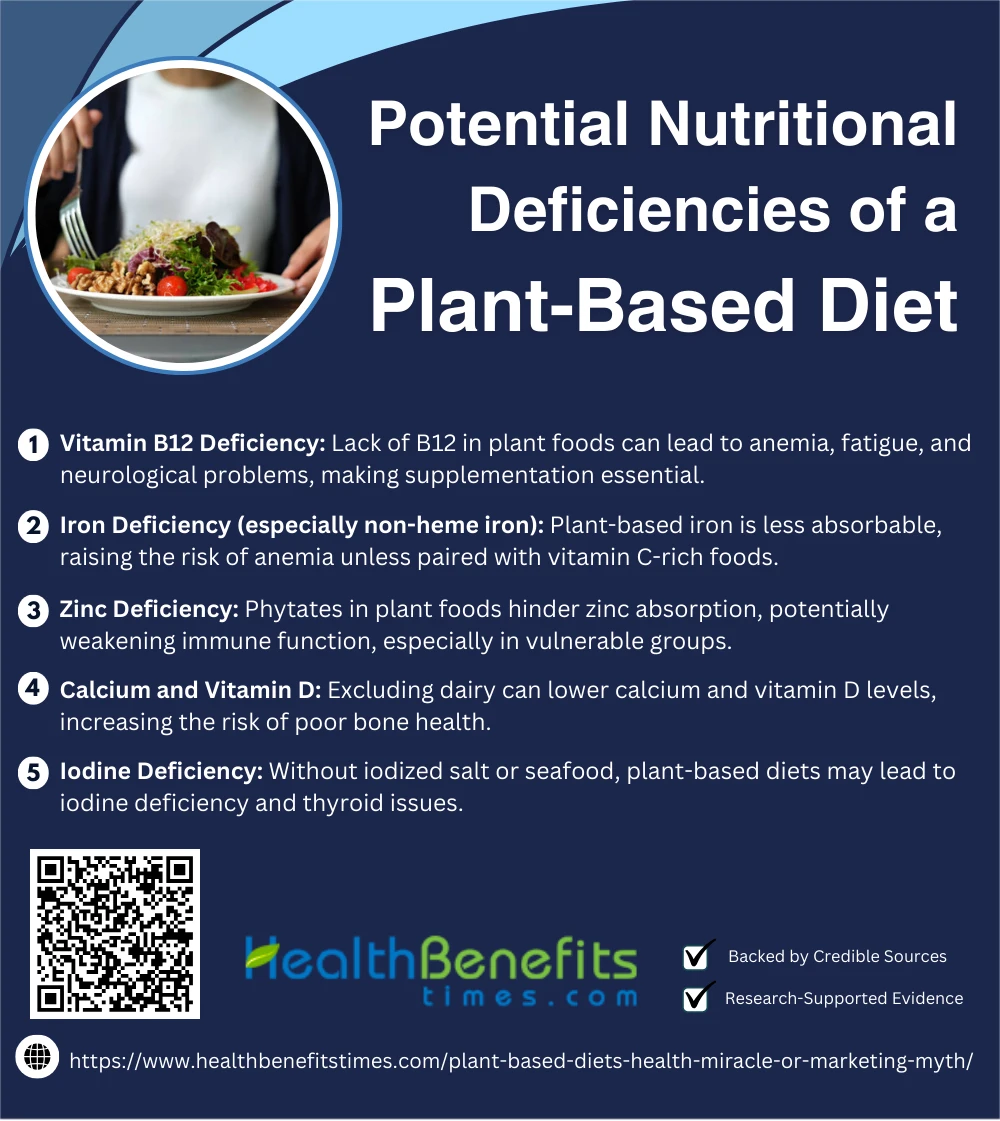- A plant-based diet focuses primarily on foods derived from plants, including vegetables, fruits, whole grains, legumes, nuts, and seeds, while minimizing or eliminating animal products.
- While many studies highlight its health and environmental benefits, not all plant-based options are inherently nutritious.
- Marketing hype and processed alternatives raise questions about whether the diet’s popularity is driven by science or savvy branding.
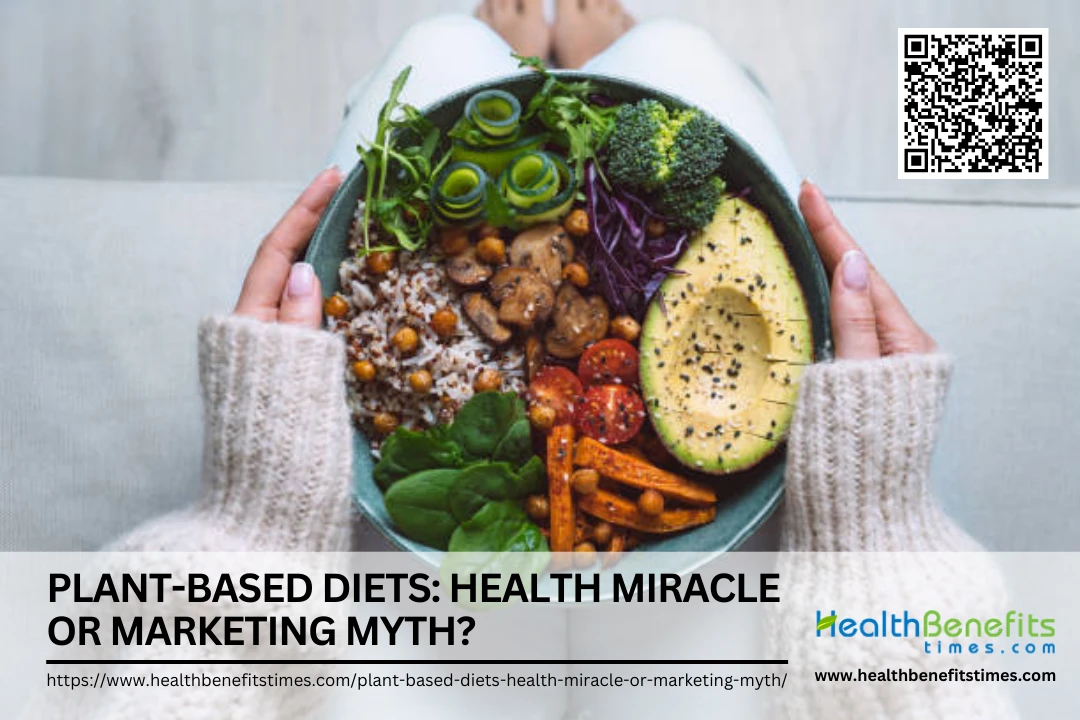 A diet is the sum of food and drink consumed by an individual, encompassing not just nutritional content but also cultural, psychological, and physiological dimensions of eating behavior. For example, Zohoori (2020) defines diet as “the total amount of food consumed by individuals,” forming the foundation of both health and disease. In recent years, plant-based diets have surged in popularity, heralded as the ultimate formula for better health, ethical eating, and environmental sustainability. From vegan burgers to dairy-free milks, the market is flooded with products marketed as not only humane but inherently healthy. Proponents argue that such diets lower the risk of chronic diseases, reduce inflammation, and contribute to longer life expectancy. Scientific literature indeed supports many of these claims. A study by Grant (2017) highlights that transitioning to a plant-based diet can significantly reduce risks associated with cardiovascular disease and diabetes. Additionally, Fehér et al. (2020) provide a comprehensive review showing that plant-based nutrition is associated with lower body fat, improved metabolic markers, and reduced prevalence of obesity and hypertension. Still, critics caution that not all plant-based foods are created equal, and many commercially available options are ultra-processed or nutritionally inadequate. As Williams and Patel (2017) argue in their cardiology-focused research, while a well-designed plant-based diet offers clear advantages, the growing commercialization often prioritizes profit over health.
A diet is the sum of food and drink consumed by an individual, encompassing not just nutritional content but also cultural, psychological, and physiological dimensions of eating behavior. For example, Zohoori (2020) defines diet as “the total amount of food consumed by individuals,” forming the foundation of both health and disease. In recent years, plant-based diets have surged in popularity, heralded as the ultimate formula for better health, ethical eating, and environmental sustainability. From vegan burgers to dairy-free milks, the market is flooded with products marketed as not only humane but inherently healthy. Proponents argue that such diets lower the risk of chronic diseases, reduce inflammation, and contribute to longer life expectancy. Scientific literature indeed supports many of these claims. A study by Grant (2017) highlights that transitioning to a plant-based diet can significantly reduce risks associated with cardiovascular disease and diabetes. Additionally, Fehér et al. (2020) provide a comprehensive review showing that plant-based nutrition is associated with lower body fat, improved metabolic markers, and reduced prevalence of obesity and hypertension. Still, critics caution that not all plant-based foods are created equal, and many commercially available options are ultra-processed or nutritionally inadequate. As Williams and Patel (2017) argue in their cardiology-focused research, while a well-designed plant-based diet offers clear advantages, the growing commercialization often prioritizes profit over health.
What Is a Plant-Based Diet?
A plant-based diet emphasizes foods derived primarily from plants—vegetables, fruits, grains, nuts, seeds, legumes—with varying degrees of exclusion of animal products. There are several distinct categories within this pattern. Vegans strictly avoid all animal products, including dairy, eggs, and honey. Vegetarians typically exclude meat but may consume dairy and eggs. The whole-food plant-based (WFPB) diet prioritizes minimally processed plant foods while avoiding refined ingredients and artificial additives. In contrast, flexitarians consume a predominantly plant-based diet but occasionally include meat or fish. (1)
Historically, plant-based eating has deep cultural roots. From the vegetarian traditions of ancient India and Greece to Buddhist diets in East Asia, plant-based practices were often rooted in spiritual, ethical, or economic reasons. In modern times, however, motivations have shifted toward health and sustainability concerns, with a growing body of evidence linking plant-centric diets to reduced chronic disease risk. (2)
Today, “plant-based” can mean different things to different people. For some, it implies total veganism, while others interpret it as simply increasing plant food intake without eliminating animal products altogether. This ambiguity has implications for both consumers and health professionals, as dietary recommendations must consider the broad and evolving spectrum of plant-based practices. (3)
Health Benefits of plant-based diet
A plant-based diet offers numerous health benefits, including improved heart health, better weight management, and reduced risk of chronic diseases, all while supporting environmental sustainability and ethical food choices.
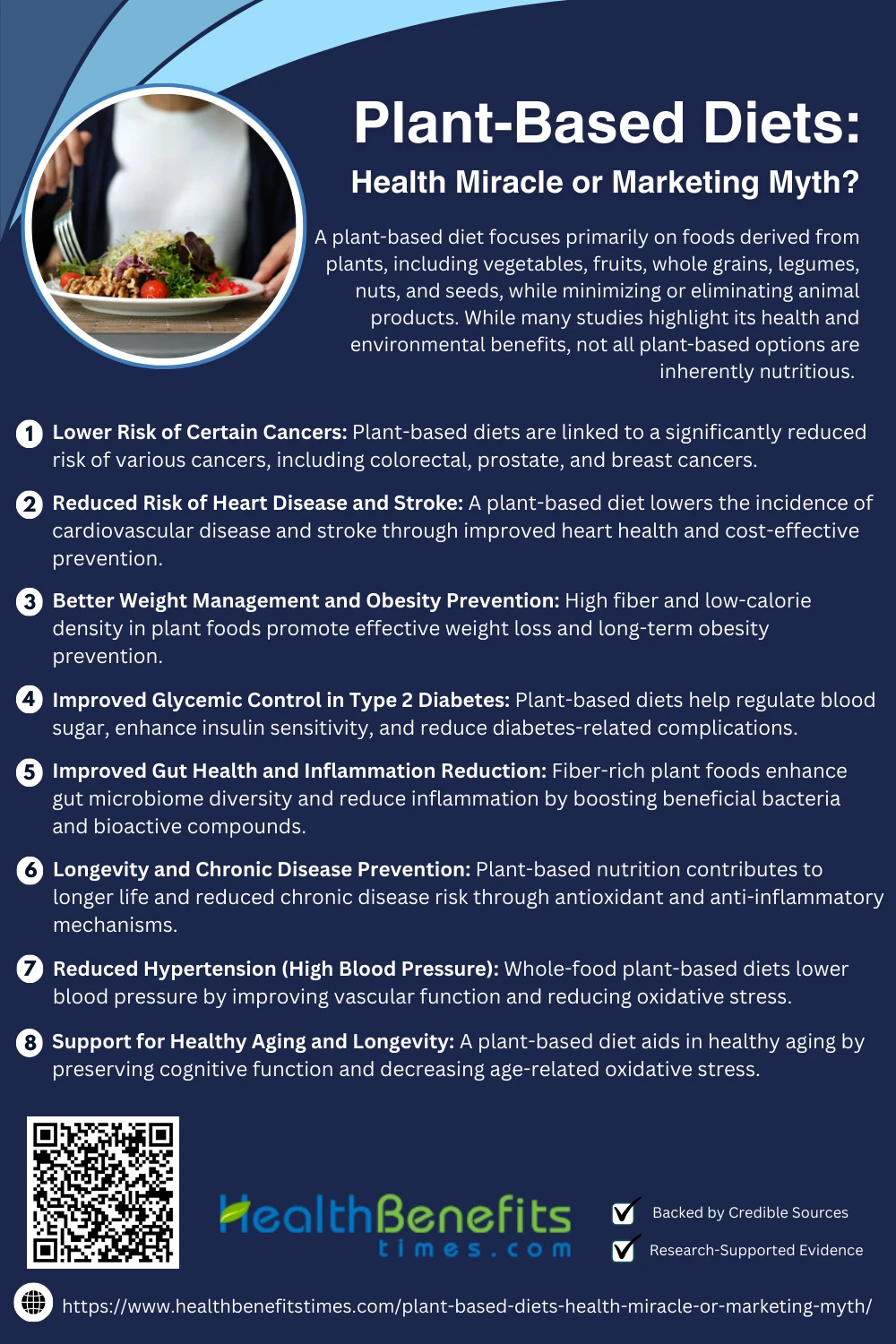 1. Lower Risk of Certain Cancers
1. Lower Risk of Certain Cancers
A growing body of research links plant-based diets to a reduced risk of several cancers. For instance, colorectal cancer rates significantly drop among those following vegetarian diets, according to Rose & Strombom (2019). (4) An umbrella review by Capodici et al. (2024) found consistent cancer risk reductions across multiple plant-based dietary patterns. (5) A large meta-analysis also observed reduced cancer-related mortality in individuals adhering to plant-centric diets. (6) Furthermore, prostate cancer outcomes improve with increased plant food intake, per Gupta et al. (2022), and recent research shows protective effects against breast cancer in women on a healthful plant-based diet. (7) (8)
2. Reduced risk of heart disease and stroke
A well-structured plant-based diet can significantly reduce the incidence of cardiovascular diseases. Research by Tuso et al. (2015) emphasized the reversal of coronary artery disease with whole-food plant-based nutrition. (9) Another extensive review by Gan et al. (2021) confirmed lower risk of cardiovascular disease and stroke in populations consuming plant-forward diets. (10) Similarly, Kim et al. (2021) found reduced cardiovascular and all-cause mortality associated with such dietary patterns. (11) Additionally, Williams & Patel (2017) highlighted the cost-effectiveness of plant-based diets in reducing heart disease burdens. (12) A meta-analysis by Lim et al. (2021) further underscored these protective effects, making plant-based nutrition a promising public health strategy. (13)
3. Better Weight management and obesity prevention
Plant-based diets are associated with lower body weight and reduced obesity risk due to their high fiber content, low energy density, and increased satiety. A 16-week clinical trial demonstrated significant weight loss and fat reduction among overweight adults following a plant-based diet. (14) Similar outcomes were seen in a randomized trial comparing five plant-based diets. (15) Najjar and Feresin (2019) also found meaningful fat reduction outcomes in overweight individuals. (16) Furthermore, Mambrini et al. (2025) reviewed PBDs and confirmed their role in obesity prevention, while Silvestre et al. (2021) highlighted sustained weight-loss benefits over three years. (17) (18)
4. Improved Glycemic Control in Type 2 Diabetes
Plant-based diets are increasingly recognized for their potential in managing type 2 diabetes through better glycemic control. Adokwe et al. (2024) found that higher intake of fruits, vegetables, legumes, and nuts was significantly associated with lower fasting blood sugar in diabetic patients. (19) Additionally, Barnard et al. (2009) demonstrated that a low-fat vegan diet improved insulin sensitivity and reduced HbA1c levels (Diabetes Care). A comprehensive review by McMacken and Shah (2017) highlighted the metabolic benefits of plant-based diets in diabetes treatment. (20) Kahleova et al. (2018) reported reduced insulin resistance after only 16 weeks on a vegan diet, and Turner-McGrievy et al. (2017) supported similar outcomes across ethnic cohorts. (21) (22)
5. Improved Gut health and inflammation reduction
Plant-based diets improve gut microbiome diversity and reduce systemic inflammation by increasing dietary fiber and phytochemicals. According to a systematic review, these diets enhance microbiota composition and immune modulation. (23) ({% trusted %}) Bioactive polyphenols in plants fortify gut barriers and suppress inflammation. (24) A clinical study on prediabetics also found improved insulin sensitivity. (25) Mediterranean plant-based meals lower gut inflammation. (26) Additionally, dietary tannins reduce harmful metabolites linked to chronic disease. (27)
6. Longevity and chronic disease prevention
Adopting a plant-based diet supports longevity and shields against chronic diseases through antioxidative and anti-inflammatory pathways. A Frontiers in Nutrition study confirms plant-forward eating lowers disease risk. Nutritional diversity linked to lifespan extension improves outcomes in elderly populations. (28) SSRN-published research emphasizes oxidative stress reduction. (29) Furthermore, herbal nutraceuticals slow disease progression. (30) Consistently, a Mediterranean dietary review highlights the role of such diets in enhancing both quality and length of life. (31)
7. Reduced Hypertension (High Blood Pressure)
Plant-based diets significantly lower blood pressure through improved vascular function and reduced oxidative stress. A systematic intervention demonstrated that hypertensive patients reduced medication reliance after dietary change. (32) According to a cross-sectional analysis, higher plant-based diet quality correlates with lower hypertension risk. (33) Another clinical study confirms positive outcomes in older adults. (34) Additionally, a review on fermented plant drinks shows antihypertensive effects. (35) Whole food plant diets achieved significant systolic pressure drops. (36)
8. Support for Healthy Aging and Longevity
A plant-based diet supports healthy aging by protecting cognitive function and reducing oxidative damage. A systematic review highlighted its role in healthy longevity via anti-inflammatory pathways. (37) Studies from Blue Zones show such diets promote lifespan through telomere maintenance. (27) Chinese cohorts showed cognitive benefits in a 10-year cohort. (38) A Frontiers study reinforced this in aging populations. (39) Similarly, lifestyle trials showed lowered oxidative stress biomarkers. (29)
Potential Nutritional Deficiencies of plant-based diet
While plant-based diets offer many health benefits, they can lead to potential nutritional deficiencies in key nutrients like vitamin B12, iron, omega-3s, calcium, and protein if not carefully planned.
Plant-based diets often lack vitamin B12, a nutrient primarily found in animal products. Deficiency may lead to anemia, fatigue, and neurological issues. A clinical overview outlines B12’s rarity in plants. Another study confirms supplementation necessity. (40) Maternal health data shows even higher risks during pregnancy and infancy without fortified foods. (41)
2. Iron Deficiency (especially non-heme iron)
Iron from plant foods is non-heme and poorly absorbed compared to animal sources. This increases the risk of iron-deficiency anemia in vegans. A ScienceDirect study highlighted low iron bioavailability. (42) Nutrient interaction research suggests vitamin C pairing improves absorption. (43) An African cohort study found higher anemia prevalence in plant-based eaters. (44)
3. Zinc Deficiency
Phytates in plant foods like legumes reduce zinc absorption, increasing deficiency risk in plant-based eaters. A ResearchGate study found reduced zinc bioavailability in vegan yogurt alternatives. (45) A maternal nutrition study emphasized risks during pregnancy. (41) Additionally, Springer data shows immune disruption tied to inadequate zinc intake. (46)
4. Calcium and Vitamin D
Avoiding dairy can reduce calcium and vitamin D levels in vegans, impacting bone health. A Calorie-Smile review notes frequent calcium deficiency. (47) SSRN research links plant-based eating with lower bone density. (29) Springer data confirms vitamin D gaps, especially in regions with low sunlight exposure. (48)
5. Iodine Deficiency
Plant-based diets often exclude iodized salt, dairy, and seafood, heightening iodine deficiency risks. A systematic review links strict vegetarianism with poor thyroid health. (49) Springer analysis confirms widespread low iodine intake among vegans. (48) Further, maternal studies emphasize risks during pregnancy due to inadequate iodine in plant-based regimens. (41)
Who Should Consider a Plant-Based Diet?
A plant-based diet can benefit a wide range of individuals, including those aiming to improve heart health, manage weight, prevent chronic diseases, or reduce their environmental and ethical impact.
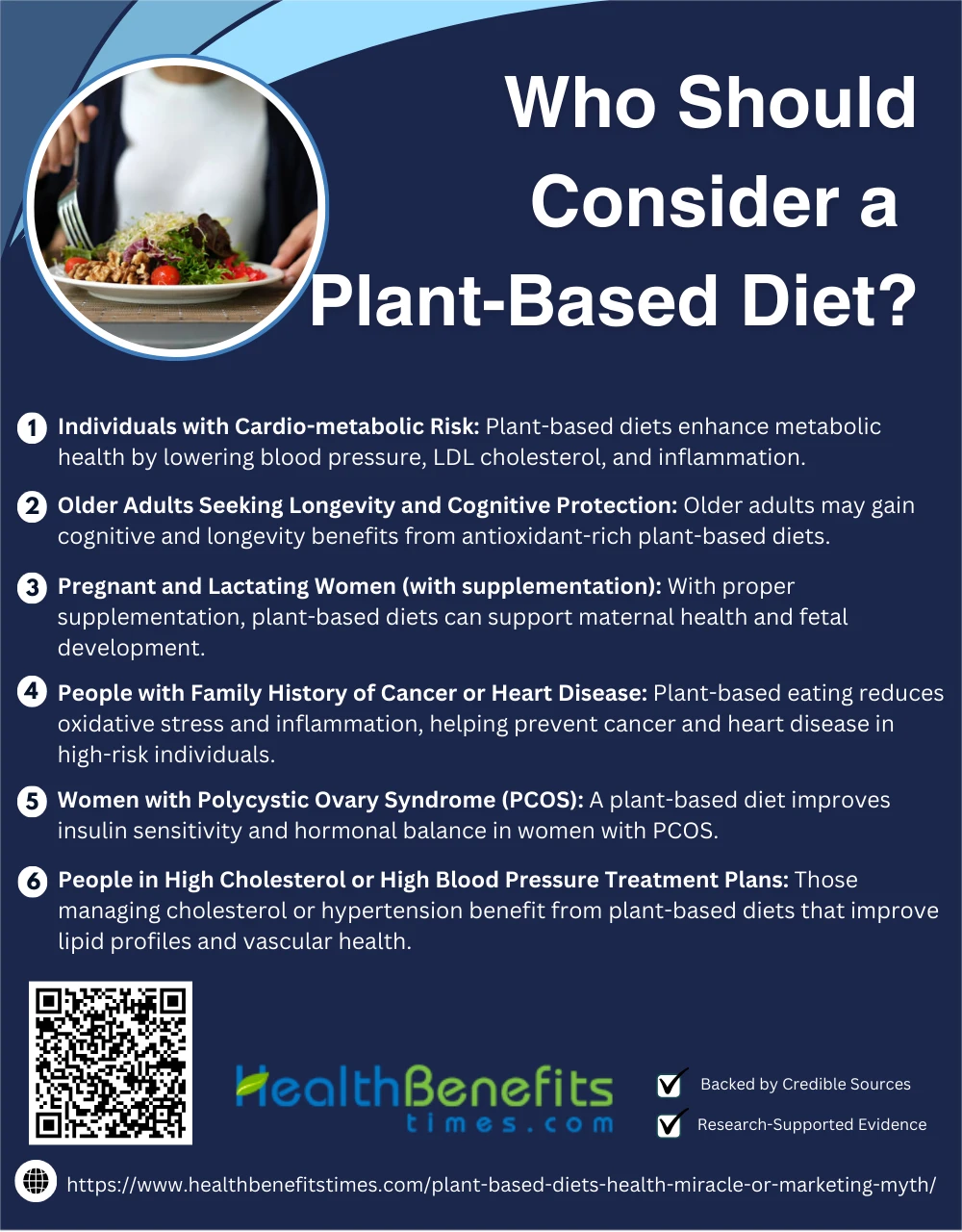 1. Individuals with Cardio-metabolic Risk
1. Individuals with Cardio-metabolic Risk
Plant-based diets improve insulin sensitivity and reduce blood pressure in individuals with cardio-metabolic risk. A randomized control trial showed rapid metabolic improvements. (50) Additionally, evidence from MDPI confirms reductions in LDL cholesterol. (33) Nutrients review also links such diets to lower BMI and improved inflammatory profiles. (51)
2. Older Adults Seeking Longevity and Cognitive Protection
Older adults benefit from plant-rich diets that enhance cognition and extend lifespan. A cognitive study revealed improved memory with nut consumption. (52) Springer research associated plant-based adherence with better mental aging. (53) Additionally, MDPI trials highlight reduced oxidative damage and vascular risks contributing to healthy aging. (54)
3. Pregnant and Lactating Women (with supplementation)
Plant-based diets can support pregnancy when well-balanced, supplying key nutrients for fetal development. A narrative review showed improved breast milk microbiome with plant-rich maternal diets. (55) Quality in Sport research emphasized safe outcomes when supplementation is used. (56) However, iodine intake remains a critical consideration, especially when excluding dairy and eggs. (57)
4. People with Family History of Cancer or Heart Disease
A plant-based diet reduces oxidative stress and inflammation—key factors in cancer and heart disease progression. Frontiers in Nutrition reports bioactive plant compounds block pathways linked to tumorigenesis. (58) The Plant-Based Handbook outlines how phytonutrients improve vascular health. (59) Additionally, Nutrients confirmed LDL and blood pressure reductions in high-risk groups. (33)
5. Women with Polycystic Ovary Syndrome (PCOS)
Women with PCOS benefit from plant-based diets due to improved insulin sensitivity and reduced inflammation. A Springer study showed improved metabolic markers. (60) ResearchGate supports herbal and fiber-rich foods for hormonal balance. (61) Citrus-based vegan meals also showed antioxidant benefit in a nutritional trial. (62)
6. People in High Cholesterol or High Blood Pressure Treatment Plans
Plant-based diets significantly reduce LDL cholesterol and improve blood pressure regulation. A JACC study confirmed the effectiveness of healthy plant-based patterns. (12) ScienceDirect research links these diets to improved cardiometabolic outcomes. (63) Additionally, SAGE Journals recommend plant-based interventions in treatment protocols for cardiovascular risk patients. (64)
Criticism and Contradictions of Plant-based diets
Despite its popularity, the plant-based diet faces criticism for overhyped health claims, nutritional gaps, and reliance on processed foods, raising questions about whether it’s truly healthier or just cleverly marketed.
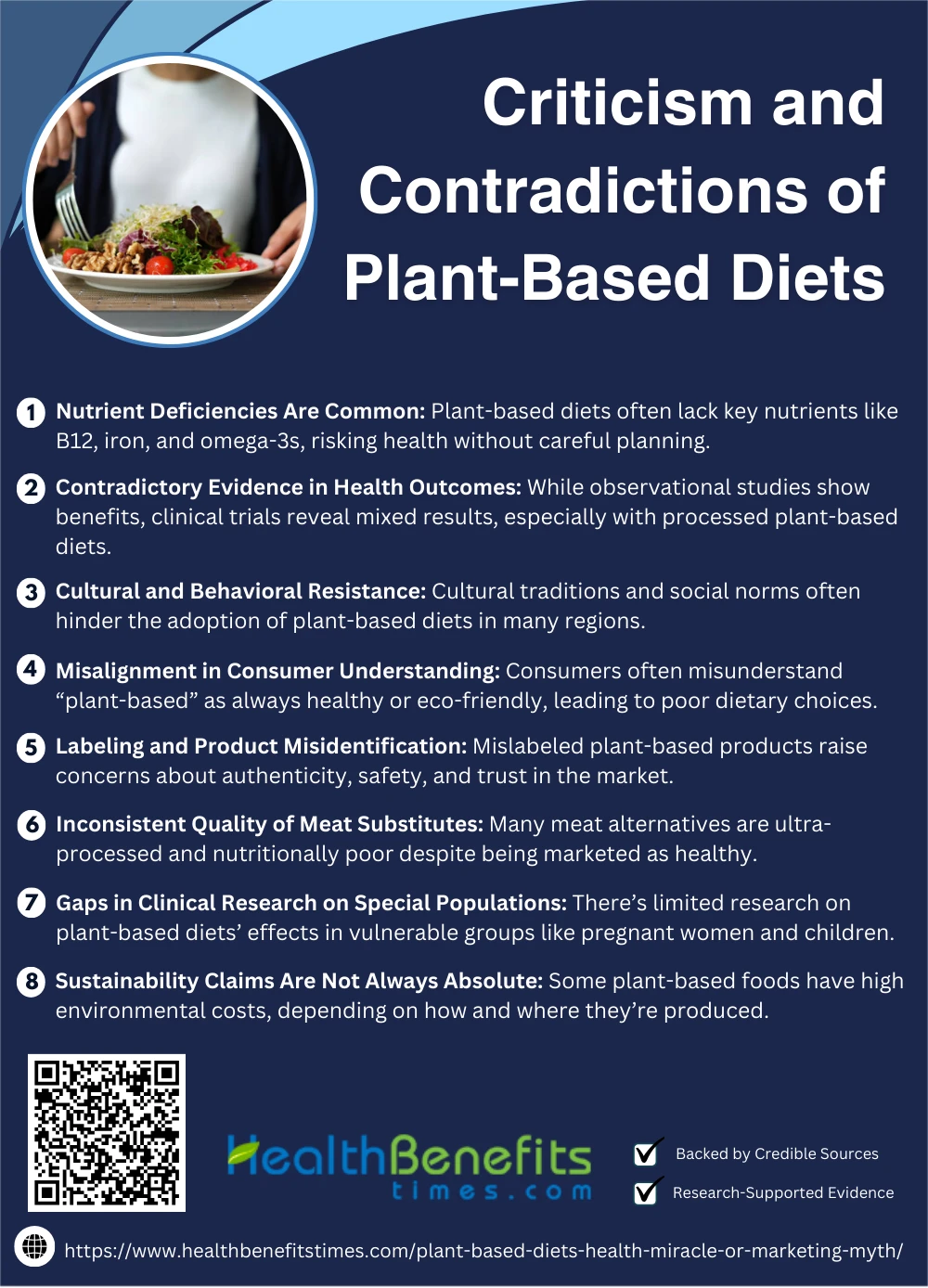 1. Nutrient Deficiencies Are Common
1. Nutrient Deficiencies Are Common
Plant-based diets are prone to deficiencies in essential micronutrients such as Vitamin B12, iron, zinc, iodine, and omega-3 fatty acids. These nutrients are either absent or poorly absorbed from plant sources. A 2025 systematic review in Cureus found that such diets, without proper planning or supplementation, can impair neurological, immune, and thyroid functions.
2. Contradictory Evidence in Health Outcomes
Although many observational studies show plant-based diets lower mortality risk, randomized controlled trials have yielded mixed results. A Frontiers in Nutrition meta-analysis (2024) noted that while healthy plant-based dietary patterns (hPDI) are protective, other plant-heavy but refined or processed diets may not offer similar benefits.
3. Cultural and Behavioral Resistance
Food is deeply tied to cultural identity. A plant-based lifestyle often faces resistance in regions where meat plays a central dietary and symbolic role. A cross-cultural study from UCP Portugal analyzed young adults in Germany and South Korea, revealing cultural loyalty and peer influence as barriers to plant-based adoption.
4. Misalignment in Consumer Understanding
Consumers often conflate sustainability with health and assume “plant-based” means “nutritious.” A Nutrition Society publication found that shoppers face conflicting messages and struggle to interpret health and eco claims. This confusion undermines informed dietary choices and can lead to overconsumption of ultra-processed vegan products.
5. Labeling and Product Misidentification
Mislabeling is a growing issue in plant-based supplements and functional foods. A 2024 SSRN study used DNA barcoding and discovered mislabeled botanical ingredients in market-sold products. This raises questions about the authenticity, efficacy, and safety of commercial “plant-based” items.
6. Inconsistent Quality of Meat Substitutes
Not all plant-based alternatives are healthy. Some meat substitutes are highly processed, with added sugars, sodium, and artificial preservatives. A Springer Nutrition Journal article criticized the misleading health halos of such products, especially among consumers unaware of their low nutrient density.
7. Gaps in Clinical Research on Special Populations
The impact of plant-based diets on pregnant women, children, and the elderly remains under-researched. A Frontiers in Global Women’s Health review highlighted limited clinical evidence on outcomes in gestational diabetes, noting inconsistencies in study design, dietary adherence, and supplementation practices.
8. Sustainability Claims Are Not Always Absolute
Though plant-based diets are marketed as eco-friendly, production of certain plant-based staples (e.g., avocados, almonds) can have high water footprints or unsustainable farming practices. A Springer 2025 audit stresses that the environmental impact depends heavily on agricultural methods, geographic location, and food transport distances.
Final Verdict: Miracle, Myth, or Moderation?
While plant-based diets offer undeniable benefits, claiming them as a “miracle” oversimplifies the science. Evidence shows significant cardiometabolic improvements and potential cancer prevention, yet contradictions arise in nutrient deficiencies, especially in Vitamin B12 and iron. (33) (23) Some authors, like T. Noakes, warn against idealizing veganism without context. Conversely, others hail it as a transformative lifestyle, like in Healthy at Last by E. Adams. However, critiques such as The Great Plant-Based Con by J. Buxton argue exaggerated claims harm credibility. Psychological and social barriers also play a role, as noted in Judge’s thesis. (65) Ultimately, as Springer and Campbell suggest, a moderate, whole-food approach—rather than a dogmatic one—is likely the most sustainable, effective, and balanced path forward. (66)
Conclusion
Plant-based diets have gained widespread attention for their potential health benefits, ethical appeal, and environmental sustainability. Scientific research supports many of these claims, particularly when the diet emphasizes whole, unprocessed foods. However, nutritional deficiencies, overreliance on processed substitutes, and marketing hype can blur the line between genuine health benefits and commercial trends. Ultimately, whether a plant-based diet is a health miracle or a marketing myth depends on individual choices, dietary quality, and nutritional planning. It’s not a one-size-fits-all solution, but for many, it offers a powerful step toward better health and conscious living—when approached with balance and informed decision-making.


